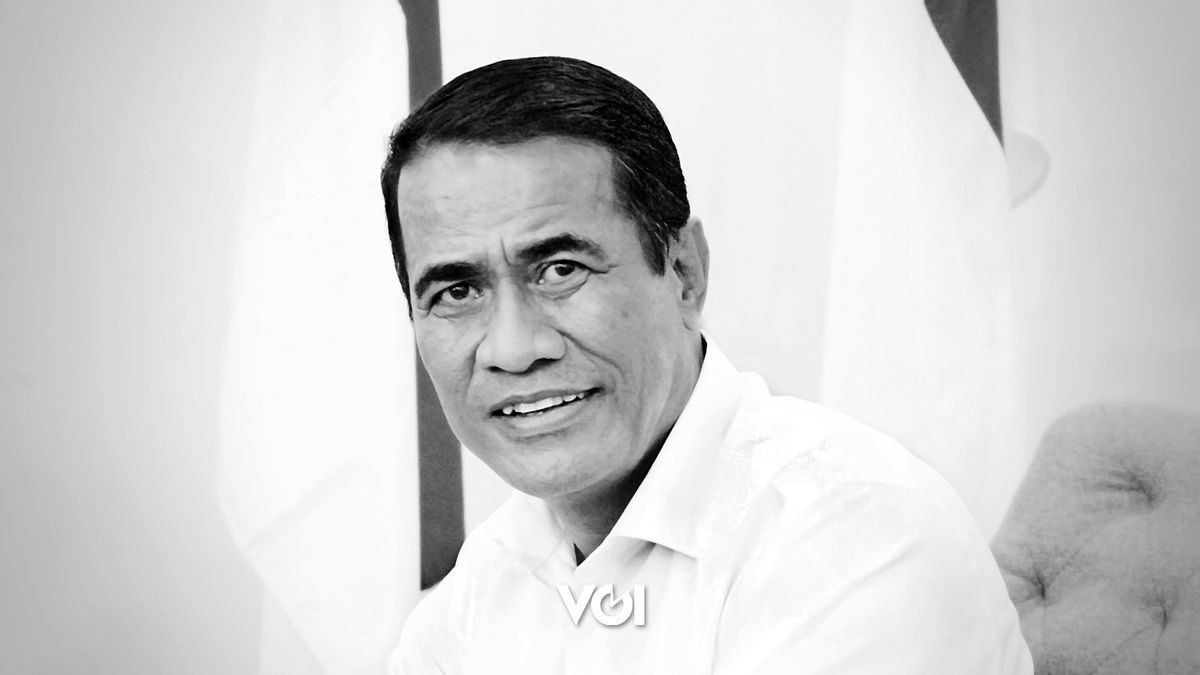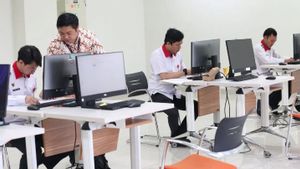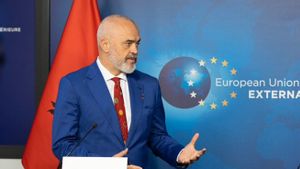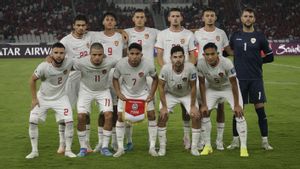The history of food sovereignty that has occurred is not impossible to achieve. That is what the Minister of Agriculture of the Republic of Indonesia, Dr. Ir. H. Andi Amran Sulaiman, MP. With cooperation between all sectors and farmers on the front line, within three years food sovereignty such as rice can be realized.
***
Talking about rice self-sufficiency, Indonesia experienced it in the era of President Soeharto in 1984. From being the largest rice importing country, Indonesia turned into a rice exporting country. Because of this success, President Soeharto was specially invited by the Director General of the Food and Agriculture Organization (FAO), Edward Saouma, to attend the World Forum on November 14 1985 in Rome, Italy to tell about the success of self-sufficiency.
Amran Sulaiman believes that with cooperation between all sectors, self-sufficiency can be realized again. "We have achieved self-sufficiency, so it is not difficult to achieve it again. My estimate is that within three years we will be self-sufficient again at the latest. We are actually thinking about exporting the existing surplus," he said. According to Amran, one of the keys to realizing rice self-sufficiency is the extensification and clearing of swamp land into rice fields. "The key is optimizing swamp land for rice planting. Every year we manage one million hectares of swamp land for rice planting, we can be self-sufficient in rice. After that we can export," he explained.
To realize this big plan, it cannot be done by the Ministry of Agriculture alone, all parties must be involved and farmers are the spearheads. Every year, according to Amran Sulaiman, 34 million tons are needed for national needs. "If you want to be self-sufficient, the concept is the easiest, give production facilities to farmers, then guarantee prices that are profitable for farmers, meaning whatever harvest can be absorbed. If this concept works well, it will definitely be self-sufficient and sustainable," he said to Edy Suherli, Bambang Eros, and Irfan Medianto from VOI visited him at the Ministry of Agriculture office, Pasar Minggu, South Jakarta, not long ago. Here's the excerpt.

Minister of Agriculture Amran Sulaiman is very concerned about the use of agricultural land, he hopes that there will be no conversion of agricultural land to other fields. (Photo: Bambang Eros, DI Raga Granada VOI)
In the past, Indonesia was an agricultural country, recently this has started to shift, agricultural land has been turned into housing, factories, etc., what is the government doing to maintain agricultural land so that it is not evicted?
We must maintain agricultural land, because this is very vital. Bung Karno once said, "The life of a nation depends on food, if there is no food then the country does not exist." Civilization does not exist without food. So food is very vital. We are very concerned that land conversion does not occur. Second, we carry out extensification, a lot of land can be opened for agricultural land. What has the potential to be opened up as agricultural land are the swamps spread throughout Indonesia, amounting to around 10 million hectares. There is also intensification, 500 hectares of swamp land which can already be harvested once, will be increased to harvest three times a year. The Governor and Regent have issued regional regulations to prevent conversion of agricultural land.
In several areas where rice barns are flooded, such as Kendal, Demak, Karawang, etc., what is the solution to this problem so that rice fields can continue to produce?
We are working with the Ministry of Public Works to normalize rivers such as the Demak area which was hit by flooding recently. For farmers, there is agricultural insurance, when crops fail due to various reasons such as floods, drought, or other reasons, farmers will receive compensation. For areas affected by flooding such as what happened yesterday in Grobogan, Demak, Kendal, there are free seeds and agricultural tools. There was something interesting when we inspected it, an area that was almost harvested in Kendal, we gave them a quick harvest tool; combine harvester, thank God saved.
The Ministry of Agriculture also carries out pumping, what is the implementation like?
Climate change makes the weather unpredictable. Indonesia is also affected by El Nino. As a result of El Nino, our rice production decreased by up to 26%. One solution is pumping, for example we pump the Bengawan Solo river and channel the water to rice fields that need it. There are also the Brantas River, Musi, etc., whose rice fields are ready to be pumped. Now we have 500,000 hectares of land ready to plant. Then fertilizer also received attention from the president. Fertilizer procurement doubled from 4.5 million tonnes to 9.5 million tonnes. This is good news for farmers. An additional budget for pumping and agriculture amounting to IDR 5.8 trillion was provided to the community.
We were self-sufficient in rice during the Soeharto era, but now we are the biggest rice importing country, can we be self-sufficient again?
We have achieved self-sufficiency, so it is not difficult to achieve it again. My estimate is that within three years we will be self-sufficient again. During my first period as Minister of Agriculture I was completely self-sufficient three times. We are actually thinking about exporting the existing surplus.
The key is optimizing swamp land for rice planting. Every year we manage one million hectares of swamp land for planting rice, we can become self-sufficient in rice. Three years in a row after that we were able to export.
What other agricultural commodities have the potential for self-sufficiency?
Apart from rice, we also have corn and shallots until now we are self-sufficient. We have also exported broiler chickens. So there are many commodities whose production can be increased. So there must be policies that favor the agricultural sector.

To achieve self-sufficiency, Minister of Agriculture Amran Sulaiman is optimistic that swamp land can be converted into new rice fields. (Photo Bambang Eros, DI Raga Granada VOI)
In the last few months we have been importing rice, but there is less and less, why is that?
There are three influencing factors. First, fertilizer was reduced by 50% because fertilizer raw materials increased. There are 20% of farmers who cannot use farmer cards, in the end the solution is to use KTP. Third; El Nino hit. In the past, we were also hit, but we were better prepared. But this year our preparations are not as good as facing the previous El Nino.
Actually, how much rice is needed for consumption by the Indonesian population and how much for industry?
Our needs and reserves require 34 million tons. Now our production is 31 million tons, the rest is covered by imports.
So what should we think about so we don't become dependent on rice imports?
Yes, we have been self-sufficient three times, we can achieve that with hard work together. It's not something difficult and then we think about exports and we become a rice barn.
How do we change our farmers who still practice traditional farming to modern farming?
This is what is interesting, if we want to compete with other countries, our farming model must be changed from traditional to modern. In the past, we planted, fertilized and plowed using conventional methods. And it uses a lot of power. By using a combine harvester, just one person is enough. So a lot of energy can be saved. If you want to be efficient you have to use agricultural technology, so agriculture has to transform. The advantage is that production can double. Because it's quicker to plant, quicker to harvest, and so on. With traditional methods the loss rate can be 10% to 20%. Because the age of the plants is not uniform, some are ripe, some are not. If you use a machine, the age difference is only a few hours.
Are our farmers ready for modern agriculture?
Some have implemented modern agriculture. We must catch up with Japan and other countries that have used modern technology, cost efficiency, and increased results. And with modernization in agriculture, millennials want to get involved; because it is profitable and there is use of technology. So we can use the demographic bonus for the agricultural sector.
We will build an agricultural area of 200,000 hectares, all using technology. Through this project we will align ourselves with agriculture in Japan and Korea. If this is successful, we will replicate it throughout Indonesia.
With the use of technology in agriculture, the existing workforce will be reduced, where will they be distributed?
These are the ones who have to transform, they work in nurseries, workshops, RMU (Rice Milling Unit), animal husbandry, horticulture, and so on. So their energy can be diverted to other sectors that are still related to the agricultural sector. So the nation's youth and children are productively involved in the field of modern agriculture. The pilot project is in South Sumatra and Central Kalimantan.
Apart from these two areas, where other areas will this concept be applied?
There are several provinces that will apply this concept, including: West Kalimantan, South Sulawesi, Lampung, West Sumatra and Aceh.
What is the solution for a bumper harvest, so that the harvest can be absorbed and prices don't fall, so that our farmers can still make a profit?
Indonesia must have cold storage (a warehouse with a certain temperature of refrigeration) that can store farmers' harvests. When the harvest is big, the government buys all the farmers' crops. When there is no harvest, this commodity can be released to the market gradually. So the harvest can be absorbed and prices can be maintained, there will be no sharp price fluctuations, which are detrimental to farmers. This cold storage not only functions as a warehouse, but also as a food price stabilizer; if there is excess, it can be exported.
If you want to be self-sufficient, the concept is the easiest, give the means of production to farmers, then guarantee a price that is profitable for farmers, meaning whatever harvest can be absorbed. If this concept works well, it will definitely be self-sufficient and sustainable. Farmers smile, consumers are happy because there are no fluctuations in food prices.
For Indonesia, how much cold storage do you estimate you need?
It needs to be built at least in five points first: North Sumatra, Lampung, Jakarta, Surabaya and Makassar. The rest can be built as needed. Other countries such as the United Arab Emirates have built cold storage like this. We only face two seasons: rainy and dry. Other countries in the northern hemisphere have much more challenges because they have to face 4 seasons throughout the year.
How big is the potential for urban farming, hydroponics, etc., how can the Ministry of Agriculture promote it?
We advise people to carry out sustainable planting around the house. For example, planting 10 chili trees in pots or hydroponics in your yard; If it can grow, grow big and bear fruit, it can meet the family's needs. Not only chilies, other household needs can also be met by growing vegetables, raising fish and raising poultry on a home scale. If this is successful, it can reduce household shopping costs, which can be quite helpful for my husband. And one more thing, the results are very healthy.
You expressed your opinion, don't disturb us in implementing programs at the Ministry of Agriculture, what does that mean and who will interfere with that?
So there are people who have personal interests when imports of food commodities occur. Please feel free to make a profit from this process, but don't interfere with the Ministry of Agriculture's program to implement programs such as self-sufficiency in certain commodities. We need to remember that imports are the same as supporting farmers from other countries. Why don't we make Indonesian farmers prosperous? I call on all parties, let's build this agricultural sector together, ministers and their staff cannot work alone. Everyone must join hands, including journalists. As we do today, let's grow and develop together. There is a young generation/millennials who will continue our struggle into the future.
How do you view the food estate program, which so far has its pros and cons? Is it still worth continuing?
In my opinion, this program must be continued. Mr President and Mr Prabowo are visionaries. The population is increasing, the solution is large-scale modern agriculture. Food estate is not about planting today, growing tomorrow, it takes a process and time. And the results can be seen. So criticism about food estates cannot be answered with rhetoric, it must be answered with real work and results. So for those who like to be annoying, I urge you to be patient. Don't just be annoying. The food sector is important and strategic, please don't disturb it. If you want to be successful you have to work hard, if you always complain you will definitely fail.
Amran Sulaiman, All for the Red and White

The love of the Minister of Agriculture, Dr. Ir. H. Andi Amran Sulaiman, MP., his beloved country Indonesia is second to none. He sacrificed the company to carry out his duties as President Jokowi's assistant. After serving as Minister of Agriculture for the first period (27 October 2014 - 20 October 2019), since 25 October 2023 he has returned to the same position.
In fact, even if he doesn't serve as a minister, he's not busy enough. However, because he had President Jokowi's trust, he was willing to focus and stop activities elsewhere, including stopping his company's operations. He was afraid of a conflict of interest while serving as the president's assistant. “Instead of being slandered and talked about, it would be better for me to close the company. "I was fully responsible for the red and white when I accepted the task as Minister of Agriculture," said the man who was born in Bone, South Sulawesi, 27 April 1968.
His main motivation for accepting the assignment from President Jokowi was for the state and nation. “My initial motivation was for red and white. Actually, even if I don't become a minister, I can still serve the country. However, because this is a call from the President, I am ready. "I came because of Allah for the red and white," he said.
“Let's all join hands for red and white. "Everyone is acting in their respective fields to improve this nation," continued Amran, who is blessed with four children from his marriage to Ir. Hj. Martin.
Because of his love for the country, Amran did not take his salary as a minister or honorarium for official trips out of town when he served as a minister. “God willing, I will not take my salary. There are many orphans here, children of employees of the Ministry of Agriculture. They wanted to go to school, I said hand over to them my salary as a minister. I am very grateful for what God has given me so far. I have got such a respectable place now. "So we can't be greedy," said Amran.
He hopes that his service as minister, continuing the previous minister Syahrul Yasin Limpo, at the end of President Jokowi's leadership period can produce something even though the time available is very limited. "Hopefully what I do, and all levels of the Ministry of Agriculture and related parties, can be useful for this country," he said.
Prospering Farmers

For Amran Sulaiman, what he did as a minister was intended for Allah SWT. “We will be able to replace what we do in this world in the next life. The problem is that our life in this world has an end, it will continue in the afterlife. Real savings are the good deeds we do. So work with your heart," said Amran, who completed his Bachelor's Degree in Agriculture at Unhas, and his Master's and Doctoral degrees at the same campus.
He is aware that not everyone is happy with the concept he is implementing. "I came with a big mission to improve the welfare of farmers according to my existing capabilities," he continued.
Even though he has only been in office for a few months, he can already see that his dreams are starting to come true. “Thank God, the fertilizer budget has been doubled. There is assistance for rice and corn seeds for 4 million hectares. "All of this is provided free of charge to Indonesian farmers," he said.
As an official, Amran admits that there are temptations that come his way. However, he must remain firm in accordance with his original intention of accepting his duties as a minister. “There will definitely be temptation. Before taking office, I told my family and friends to allow me to fight for the country. I ask not to be disturbed. "I will give you an understanding not to play around in the agricultural sector," he said.
In line with his duties as minister, Amran has just appointed Komjen Pol. Setyo Budiyanto as Inspector General who previously served at the Corruption Eradication Commission (KPK). He hopes that his path will be in line with the new Inspector General and other officials in the Ministry of Agriculture.
Close Tiran

As a professional, Amran owns a company that produces rat poison under the Tiran brand (Rats poisoned by Amran). Even though this company is good and profitable. However, because he served as a minister, this company was closed. “My rat poison factory stopped operating. "I don't want any slander," said the man who owns the Tiran rat poison patent.
Because he chose to serve red and white, Amran had to be willing to close his own business. “Even though it is my best company. I had to let go of being closed. "In the past, our grandmothers fought to give their lives for the red and white, but can't we give up our company for the country we love?" he said.
Amran is grateful for what he has achieved now. “I was very poor for 36 years. When I go to Jakarta, I sleep in the mosque. Now, thank God, it's a little better," said the winner of the Satyalancana Development in the field of Agricultural Entrepreneurship from the President of the Republic of Indonesia 2007.
Tips for success, said Amran, are to have big dreams. “If you have big dreams, you have to take action. Must have the courage to start and be consistent. "If you are used to working hard and working sincerely, success is in sight," he stressed.
Many people don't succeed, continued Amran, because they lack patience. "The trials to be successful are indeed difficult, you have to be patient and tenacious so that success can be achieved," he continued. "Success does not know the words complaining and the words failure," said the recipient of the Mahaputera Adipradana Star from the President of the Republic of Indonesia, 2020.
Apart from that, what is no less important in order to get the pleasure of Allah SWT is to honor your parents. "It is very important to glorify your mother, your mother, and your mother, and also your father," concluded Amran Sulaiman.
"If you want to be self-sufficient, the concept is the easiest, give the means of production to farmers, then guarantee a price that is profitable for farmers, meaning whatever harvest can be absorbed. If this concept works well, it will definitely be self-sufficient and sustainable,"
The English, Chinese, Japanese, Arabic, and French versions are automatically generated by the AI. So there may still be inaccuracies in translating, please always see Indonesian as our main language. (system supported by DigitalSiber.id)













